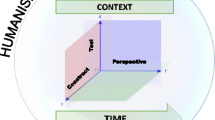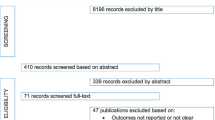Abstract
Proposed educational outcomes for the health humanities in medical education range from empathy to visual thinking skills to social accountability. This lack of widely agreed-upon high-level curricular goals limits humanities educators’ ability to design purposeful curricula toward clear, common ends and threatens justifications for scarce curricular time. We propose a novel approach to the hoped-for outcomes of health humanities training in medical schools, which has the potential to encompass traditional health humanities knowledge, skills, and behaviors while also being concrete and measurable: humanistic practice. Humanistic practice, adapted from the concept of ethical sensitivity, is an intentional process of applying humanities knowledge and skills to a clinical scenario by 1) noticing that the scenario requires humanities knowledge or skills, 2) informing one’s clinical and interpersonal strategy and behavior with humanities knowledge or skills, 3) reflecting on the effectiveness of the strategy and behavior, and 4) reorienting to develop new approaches for future practice. The construct of humanistic practice may help address some of the foundational problems in health humanities outcomes research since it transcends the traditional diverse content domains in the health humanities, can link patient and provider experiences, and may bridge the divide among the additive, curative, and intrinsic epistemic positions of humanities to medical education.
Similar content being viewed by others
References
Agarwal, Gauri G., Meaghan McNulty, Katerina M. Santiago, Hope Torrents, and Alberto J. Caban-Martinez. 2020. “Impact of Visual Thinking Strategies (VTS) on the Analysis of Clinical Images: A Pre-Post Study of VTS in First-Year Medical Students.” Journal of Medical Humanities 41 (4): 561–72. https://doi.org/10.1007/s10912-020-09652-4
AAMC (Association of American Medical Colleges). 2022. Diversity, Equity, and Inclusion Competencies Across the Learning Curriculum. Washington, DC: AAMC.
Balhara, Kamna S., Michael R. Ehmann, and Nathan Irvin. 2022. “Antiracism in Health Professions Education Through the Lens of the Health Humanities.” Anesthesiology Clinics 40 (2), 287–99. https://doi.org/10.1016/j.anclin.2021.12.002
Buck, Era, Mark Holden, and Karen Szauter. 2015. “A Methodological Review of the Assessment of Humanism in Medical Students.” Academic Medicine 90 (11): S14–S23. https://doi.org/10.1097/ACM.0000000000000910
Carr, Sandra E., Farah Noya, Brid Phillips, Anna Harris, Karen Scott, Claire Hooker, Nahal Mavaddat, et al. 2021. “Health Humanities Curriculum and Evaluation in Health Professions Education: A Scoping Review.” BMC Medical Education 21 (1): 1–10. https://doi.org/10.1186/s12909-021-03002-1
Cruess, Richard L., Sylvia R. Cruess, J. Donald Boudreau, Linda Snell, and Yvonne Steinert. 2015. “A Schematic Representation of the Professional Identity Formation and Socialization of Medical Students and Residents: A Guide for Medical Educators.” Academic Medicine 90 (6): 718–25. https://doi.org/10.1097/ACM.0000000000000700
Cruess, Richard L., Sylvia R. Cruess, and Yvonne Steinert. 2018. “Medicine as a Community of Practice: Implications for Medical Education.” Academic Medicine 93 (2): 185–91.
Dennhardt, Silke, Tavis Apramian, Lorelei Lingard, Nazi Torabi, and Shannon Arntfield. 2016. “Rethinking Research in the Medical Humanities: A Scoping Review and Narrative Synthesis of Quantitative Outcome Studies.” Medical Education 50 (3): 285–99. https://doi.org/10.1111/medu.12812
Green, Michael J. 2015. “Comics and Medicine: Peering Into the Process of Professional Identity Formation. Academic Medicine 90 (6): 774–79. https://doi.org/10.1097/acm.0000000000000703
Howley, Lisa, Elizabeth Gaufberg, and Brandy King. 2020. The Fundamental Role of the Arts and Humanities in Medical Education. Washington, DC: AAMC. https://store.aamc.org/the-fundamental-role-of-the-arts-and-humanities-in-medical-education.html
Joseph, Kimera, Karlen Bader, Sara Wilson, Melissa Walker, Mark Stephens, and Lara Varpio. 2017. “Unmasking Identity Dissonance: Exploring Medical Students’ Professional Identity Formation Through Mask Making.” Perspectives on Medical Education 6 (2): 99. https://doi.org/10.1007/s40037-017-0339-z
Kenny, Ailbhe, Michael Finneran, and Eamonn Mitchell. 2015. “Becoming an Educator in and Through the Arts: Forming and Informing Emerging Teachers’ Professional Identity.” Teaching and Teacher Education 49:159–167. https://doi.org/10.1016/j.tate.2015.03.004
Keogh, Francesca Maria, Alice Lee, and Fiona Gibbon. 2020. “Visual Thinking Strategies: Experiences of an Arts-Based Curriculum in an Irish University Medicine and Health Faculty.” All Ireland Journal of Higher Education 12 (1).
Klugman, Craig M., Jennifer Peel, and Diana Beckmann-Mendez. 2011. “Art Rounds: Teaching Interprofessional Students Visual Thinking Strategies at One School.” Academic Medicine 86 (10): 1266–71. https://doi.org/10.1097/ACM.0b013e31822c1427
Kumagai, Arno K., and Thirusha Naidu. 2019. “The Cutting Edge: Health Humanities for Equity and Social Justice.” In Routledge Handbook of the Medical Humanities, edited by Alan Bleakley, 83–96. London: Routledge. https://doi.org/10.4324/9781351241779
Magaña, Dalia, Christina Lux, and Ignacio López-Calvo, eds. 2023. Medical Humanities, Cultural Humility, and Social Justice. San Francisco: University of California Health Humanities Press.
Moniz, Tracey, Maryam Golafshani, Carolyn M. Gaspar, Nancy E. Adams, Paul Haidet, Javeed Sukhera, Rebecca L. Volpe, et al. 2021. “How Are the Arts and Humanities Used in Medical Education? Results of a Scoping Review.” Academic Medicine 96 (8): 1213–22. https://doi.org/10.1097/ACM.0000000000004118
Muramatsu, Taeko, Mieko Nakamura, Eisaku Okada, Harumi Katayama, and Toshiyuki Ojima. 2019. “The Development and Validation of the Ethical Sensitivity Questionnaire for Nursing Students.” BMC Medical Education 19 (1): 1–8. https://doi.org/10.1186/s12909-019-1625-8
Rest, James. 1979. Development in Judging Moral Issues. Minneapolis: University of Minnesota Press.
Shapiro, Johanna, Juliet McMullin, Gabriella Miotto, Tan Nguyen, Anju Hurria, and Minh Anh Nguyen. 2021. “Medical Students’ Creation of Original Poetry, Comics, and Masks to Explore Professional Identity Formation.” Journal of Medical Humanities 42 (4): 603–25. https://doi.org/10.1007/978-3-031-19227-2_7
Volpe, Rebecca L., Margaret Hopkins, Lauren Jodi Van Scoy, Daniel R. Wolpaw, and Brita M. Thompson. 2019. “Does Pre-Clerkship Medical Humanities Curriculum Support Professional Identity Formation? Early Insights from a Qualitative Study.” Medical Science Educator 29 (2): 453–62. https://doi.org/10.1007/s40670-018-00682-1
Weaver, Kathryn, and Janice M. Morse. 2006. “Pragmatic Utility: Using Analytical Questions to Explore the Concept of Ethical Sensitivity.” Research and Theory for Nursing Practice 20 (3): 191–214.
Weaver, Roslyn, Kath Peters, Jane Koch, and Ian Wilson. 2011. “ ‘Part of the Team’: Professional Identity and Social Exclusivity in Medical Students.” Medical Education 45 (12): 1220–29. https://doi.org/10.1111/j.1365-2923.2011.04046.x
Funding
None
Author information
Authors and Affiliations
Corresponding author
Ethics declarations
Disclosure Statement
The authors report there are no competing interests to declare.
Ethical Approval
Not applicable
Additional information
Publisher's Note
Springer Nature remains neutral with regard to jurisdictional claims in published maps and institutional affiliations.
Rights and permissions
Springer Nature or its licensor (e.g. a society or other partner) holds exclusive rights to this article under a publishing agreement with the author(s) or other rightsholder(s); author self-archiving of the accepted manuscript version of this article is solely governed by the terms of such publishing agreement and applicable law.
About this article
Cite this article
Volpe, R.L., Hausman, B.L. & Dalke, K.B. A New Construct in Undergraduate Medical Education Health Humanities Outcomes: Humanistic Practice. J Med Humanit (2024). https://doi.org/10.1007/s10912-024-09847-z
Accepted:
Published:
DOI: https://doi.org/10.1007/s10912-024-09847-z




